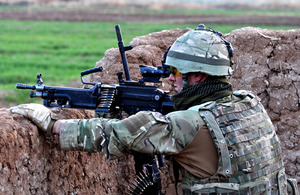Ambushed SCOTS troops defeat Taliban attackers
British soldiers working alongside Afghan Police to clear insurgents from a contested area in Helmand's Lashkar Gah district have survived a well-organised attack to turn the tables on their assailants.

A soldier from D Company, 5 SCOTS, provides cover for an assault on an insurgent position [Picture: Captain Niall Archibald, Crown Copyright/MOD 2011]
Soldiers from The Argyll and Sutherland Highlanders, 5th Battalion The Royal Regiment of Scotland (5 SCOTS), worked alongside their partners from the 2nd Kandak of the Afghan Uniformed Police to conduct the ‘advance to contact’ - an operation to engage enemy fighters in an area known as Shindac Mandah, north of Patrol Base Attal in Lashkar Gah district.
Troops from Delta Company of Canterbury-based 5 SCOTS have been in Helmand since September 2010, mentoring the Afghan police officers who are increasingly taking over security responsibilities in the area. They return home in April.
Their aim in this operation was to sweep away insurgent fighters operating in the area, and demonstrate to locals that the police and other institutions of governance in Helmand are now in control and have complete freedom of movement.
These aims were eminently achieved and, in addition, four insurgents were killed plus a further two key insurgent ringleaders in the community detained.
A combined force of more than 100 men from 5 SCOTS and the Afghan Police crossed the line of departure at 0630hrs and headed north toward an area known to be held by insurgents.
As they moved north the police interacted with the local people they met, stopping for cups of chai and discussing the forthcoming harvest and plans to open a new school. Such interaction between the Afghan Police and the people is vital in building up intelligence and gauging what soldiers call the ‘atmospherics’ - the feeling of an area which tells soldiers whether it’s safe or there is a threat.
As the force moved further north, these atmospherics began to change. Families were seen hurriedly leaving compounds and the fields were empty of workers. Then, at 0840hrs, the British soldiers and Afghan policemen were suddenly engaged from five separate firing points.
The insurgent attack was well organised. Although the firing points were spread far apart, they engaged the Delta Company troops simultaneously. But the British troops and their Afghan Police partners immediately took up positions and returned an overwhelming weight of fire into the identified insurgent firing points.
The men of Delta Company have been under fire many times in recent months and know the ground well. Soon the Company Commander, Major Nick Wight-Boycott, had confirmed the location of all the firing points and was able to co-ordinate with his Fire Support Team a plan to suppress the insurgent positions with artillery fire before sending his troops in. One by one, the insurgent positions were cleared.
In the west, Lieutenant Luke McDonagh and his men surprised two insurgents attempting to extract from their position as the battle began to go Delta Company’s way. The insurgents fought hard, but were cut down by Lieutenant McDonagh’s platoon. One died there, the other fell injured.
Lieutenant McDonagh’s men gave life-saving treatment to the injured insurgent fighter, before a helicopter was called in to evacuate him to hospital in Camp Bastion. His life may have been saved but, once discharged from hospital, he faces a life of imprisonment.
The Afghan Police then captured an insurgent commander who was found hiding at the firing point nearby. The police used the skills they have learned from the British troops to detain this commander and move him back to their base for questioning and forensic analysis.
Meanwhile in the centre of the village, Sergeant Frankie Kerr and his men were taking heavy fire from a position to their north. A combination of artillery and an air strike gave them the space they needed to advance to the insurgent positions, covered by fire from Lieutenant James Cook and his group of men.
As Sergeant Kerr and his platoon cleared the positions, neutralising the insurgents there with accurate rifle fire and bayonets, they were engaged once more by machine gun fire and rocket-propelled grenades from the east. An attack helicopter was called in which quickly identified the position and solved the problem of the incoming fire by dropping a Hellfire missile.
The attack helicopter passed a message to Major Wight-Boycott that insurgents could be seen recovering their dead to the north. Once more Delta Company pushed on, pressing home the advantage of the momentum they had built, and forcing the remaining few insurgents to give up trying to recover the bodies and flee the area.
Major Wight-Boycott said:
The operation was a significant blow to the insurgency in Delta Company’s area. The combination of such aggressive patrols targeting the insurgency directly, with increased development and support of the civilian population, has seen the insurgent’s support base and ability to operate considerably eroded over recent months.
The fact that it is a joint force of Afghan Police and UK troops providing this increased security is a promising sign for the longer term, when the Afghan security forces will be expected to do this on their own.